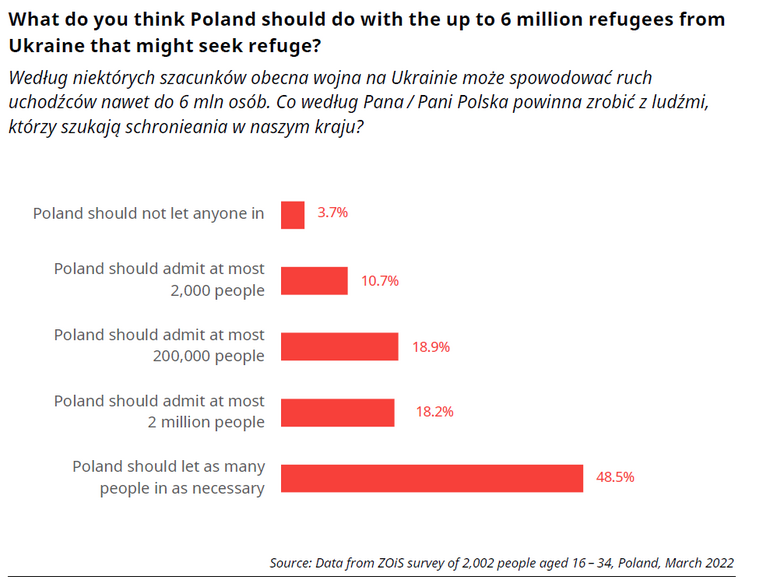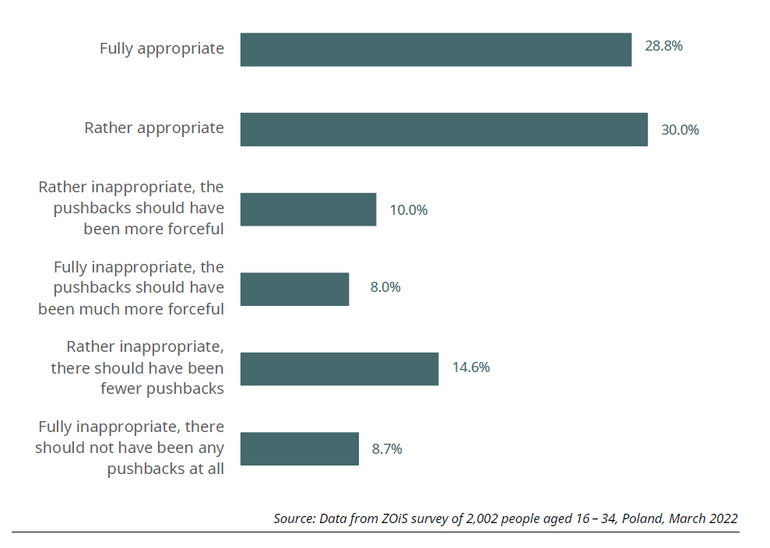Survey shows strong support for Ukrainian refugees among young Poles
A new ZOiS Report looks at attitudes of young people in Poland towards refugees as an expression of their sense of Polish identity. Most survey respondents approve of strong political support for Ukraine and welcome Ukrainian refugees. There is, however, less acceptance for integrating them long term. The participants of focus groups voice fears about the social challenges that might develop.
In March 2022, ZOiS conducted an original online survey in Poland among 2,002 respondents aged 16–34. The results confirm the welcoming attitude young Poles have towards Ukrainian refugees. The authors Félix Krawatzek and Piotr Goldstein report that ‘nearly half of the respondents state that Poland should let in as many refugees from Ukraine as necessary’. (Fig.1) There is also overall approval for the political support for Ukraine, in particular when it comes to supplying humanitarian assistance. In addition, nearly 15% of respondents support the deployment of Polish soldiers to Ukraine. However, when asked what they think should be offered to the Ukrainians, a more mixed picture emerges. The most popular option is the idea that refugees should be offered temporary support on the assumption that they will return to Ukraine as soon as it becomes possible or continue their journey to another European country.
The supportive attitude towards Ukrainian refugees stands in contrast to the overwhelming endorsement of the pushbacks of the mostly Muslim refugees who have tried to enter Poland via Belarus, where they have been stranded after the Lukashenka regime lured them there in 2021. (Fig. 2) There is, moreover, very low support for granting those refugees the right to apply for asylum, with only 9% of young people stating that these people should definitely have the right to apply.
The Report explores the political attitudes, electoral choice and political mobilisation of young people. Beyond electoral participation, young Poles have been active in protests, notably in response to the PiS-initiated tightening of the abortion law, but also related to the ruling party’s violation of the rule of law and media freedom. Of the young respondents to our survey, more than one-quarter state that they have participated in protests in the last two years.
The survey also enquired into young people’s opinions on Polish history and on the country’s place in Europe, both of which are central to understandings of identity. Young Poles express a very strong emotional attachment to Poland, their local regions and cities. They also claim an emotional attachment to the European Union and Europe in general, as well as to Central Europe but not to Eastern Europe understood as a region also comprising Ukraine and Belarus. (Fig. 3)
The survey was combined with insights from focus group discussions, which helped to explain the trends identified in the survey: ‘What the combined analysis of focus group discussions and survey data reveal is the extent to which fear and uncertainty characterise the young generation of Poles who are facing both immediate challenges and an unpredictable future for which the parental generation can provide only little guidance,’ the authors of the report conclude.
Figures


